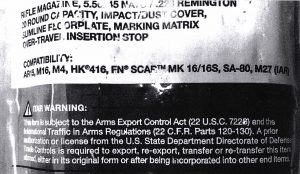Russian who attempted to smuggle weapons parts sentenced
By Bill Dwyer For Chronicle Media — April 10, 2018
Packaging on a 30-round magazine found in Konstantin Chekhovksoi’s luggage. (Photo from federal court filing)
A Russian businessman who attempted to leave the United States with 11 suitcases full of firearms components April 2017 was sentenced to 18 months in prison on March 22.
Konstantin Chekhovksoi, who pleaded guilty in January, has been in federal custody since his arrest, was also fined $100,000 by Judge Sara L. Ellis.
Prosecutors say Chekhovksoi, 44, of St. Petersburg, Russia, packed 950 firearms parts and ammunition valued at more than $100,000 into luggage checked into a flight for Stockholm, Sweden. Among the contents of that luggage were boxes of bullets, scopes and “approximately 196 magazines, 55 stocks, and 98 triggers.”
Many of those components, prosecutors say, were designed for assault rifles such as AR-15s, AK-47s and M4’s.
Chekhovksoi, who had entered the U.S. in early April, 2017 on a tourist visa, spent three weeks in Ohio before returning to Chicago.
On April 26, Customs and Border Patrol (CBP) agents at O’Hare Airport confiscated Chekhovksoi’s luggage from his airline, then stopped Chekhovksoi as he was about to board his flight to Stockholm.
When asked by agents why he required 11 pieces of luggage and what they contained, Chekhovksoi, reportedly replied that he had “purchased items for his wife and himself.”
After being informed of his Miranda rights, prosecutors say, Chekhovksoi then admitted that he’d purchased the weapons components. He later stated that the material was “commercial stock he intended to sell at hunting/fishing retail stores and lodges he owns in Russia and Finland.”
Chekhovksoi denied knowing that he needed an export license, telling agents that “since they were only plastic and metal parts and not whole weapons, and thus not dangerous, that they could be exported.”
“He also said he believed it was not possible to ship whole weapons.”
But most of the components in Chekhovksoi’s luggage were in packaging that clearly stated that the item enclosed “is subject to the Arms Export Control Act.”
Agents also recovered numerous invoices and packing slips in the luggage of Chekhovksoi, all of which noted conspicuously that the weapons components were under federal export controls and could not be transferred “… without first obtaining approval from the U.S. government.”
Chekhovksoi’s attorney argued that his client had “no nefarious motive behind his actions” and that he was only trying to save money after having spent such a large amount on the weapons components. However, the government clearly wasn’t buying that explanation.
“Given that defendant has previously altered his story regarding his intent in exporting the firearm parts and accessories, as well as the fact that a great number of the firearm parts and accessories were manufactured for assault rifles such as AK- 47’s and M4’s, the government is deeply skeptical of defendant’s claim that they were destined solely for hunting stores and lodges in Russia and Finland,” prosecutors said.






